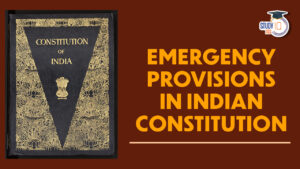Table of Contents
Schedules of Indian Constitution
The Constitution of India consists of 12 schedules, 25 parts and 450 Articles (approx.). Originally, there were 8 schedules, 22 parts and 395 articles consisting in the Constitution of India, during the adoption of the Indian Constitution in 1949. The initial reference to Schedules emerged in the Government of India Act, 1935, encompassing 10 Schedules. The Schedules of the Indian constitution form a crucial part of the country’s legal system. The Schedules of Indian Constitution are the additional and important provisions that offer in-depth information regarding many areas of the constitution.
Schedules of Indian Constitution are an important topic for the UPSC Exam as mentioned in the UPSC Syllabus of Paper II. Check the details on the Schedules of Indian Constitution below.
List of Schedules of Indian Constitution
The Indian Constitution comprises 12 schedules each playing a vital role in shaping the legal and administrative framework of the country. These schedules provide detailed provisions and guidelines on various matters, ranging from the allocation of seats in the Rajya Sabha to the forms of oaths and affirmations. Here is a brief overview of the List of Schedules of Indian Constitution and related Articles of the Indian Constitution.
| Schedules of Indian Constitution | Articles of Indian Constitution |
| First Schedule | Article 1 and Article 4 |
| Second Schedule |
|
| Third Schedule |
|
| Fourth Schedule | Article 4 and Article 80 |
| Fifth Schedule | Article 244 |
| Sixth Schedule | Article 244 and Article 275 |
| Seventh Schedule | Article 246 |
| Eighth Schedule | Article 344 and Article 351 |
| Ninth Schedule | Article 31-B |
| Tenth Schedule | Article 102 and Article 191 |
| Eleventh Schedule | Article 243-G |
| Twelfth Schedule | Article 243-W |
Schedules of Indian Constitution Overview
Schedules of Indian Constitution are basically used for simplifying the provision of the constitution and making them easier to understand by segregating the legal aspect from the additional information. Although the schedules are part of the Constitution, they are not kept in the Constitution but are included as separate documents of great relevance. Schedules do not have any legal component, which makes the provisions easy to comprehend. Check the Schedules of Indian Constitution Overview in the table provided below:
| Schedules of Indian Constitution | |
| Particulars | Details |
| First Time Schedules were mentioned in | First time in 1935, the Constitution of India cited the schedules of the Government Of India Act 1935, which brings transparency to the Constitution. |
| Schedules Originally in Constitution | Originally, the Indian Constitution had 8 schedules |
| Present Status of Schedules in Constitution | At present, there are 12 schedules of the Indian Constitution |
| Amendments in Schedules |
|
| Schedule 8 of the Constitution | Originally there were 14 Languages mentioned in the constitution
|
Features of Schedules of Indian Constitution
The idea of a Schedule was added to Indian Constitution as it is the lengthiest written constitution in the world. Although, schedules were added so that any additional information concerning the article or part of the constitution can be added in it, which has not been added in the articles or parts of the constitution. Schedules facilitate the process of amending the articles, adding or deleting any sections, and making modifications considerably simpler because of their separate divisions. Check the essential features of the schedule of the Indian Constitution below:
- Only eight schedules were in the Indian Constitution at the time of enactment in November 1949.
- At present, there are 12 Schedules present in the Indian Constitution.
- Land Reform was added to the 9th Schedule of the Indian Constitution in 1951 by the 9th Constitutional Amendment Act.
- Anti Defection Law was added to the 10th Schedule of the Indian Constitution in 1985 by the 52nd Constitutional Amendment Act.
- Panchayat was added in the 11th schedule where as Municipality was added in the 12th schedule in 1992 by the 73rd and 74th Constitutional Amendment Act.
12 Schedules of Indian Constitution
Important details about territories, the distribution of Rajya Sabha seats, the management and control of scheduled areas and tribes, the allocation of powers between the Central government and state governments, and the compensation and privileges of senior officials have been mentioned in the schedules. Check the List of 12 Schedules of Indian Constitution and their provisions as provided in the table below.
|
12 Schedules of Indian Constitution |
||
| Schedules of Indian Constitution | Subject discussed under this Schedules | Articles under the Schedule |
| First Schedule |
|
Article 1
Article 4 |
| Second Schedule | It deals with the provisions relating to the emoluments, allowances and privileges of:
|
Article 59(3)
Article 65(3) Article 75(6) Article 97 Article 125 Article 148(2) Article 158 Article 164(3) Article 186 Article 221 |
| Third Schedule | It consists of the forms of oath or affirmations for:
|
Article 75(4)
Article 84 Article 99 Article 124(6) Article 148(2) Article 164(3) Article 173 Article 188 Article 219 |
| Fourth Schedule | It deals with provisions related to the allocation of seats in the Rajya Sabha to the States and Union Territories | Article 4(1)
Article 80(2) |
| Fifth Schedule | It consists of the provisions related to the administration and control of scheduled areas and scheduled tribes in India | Article 244(1) |
| Sixth Schedule | This schedule deals with the provisions related to the administration of tribal areas in the states of
|
Article 244(2)
Article 275(1) |
| Seventh Schedule | It consists of three lists which divide the power between the Union and the States.
|
Article 246 |
| Eighth Schedule | It consists of a list of 22 Indian languages which are recognized by the Indian Constitution. The list of 22 Indian languages have mentioned below:
Assamese, Bengali, Bodo, Dogri (Dongri), Gujarati, Hindi, Kannada, Kashmiri, Konkani, Mathili (Maithili), Malayalam, Manipuri, Marathi, Nepali, Oriya, Punjabi, Sanskrit, Santhali, Sindhi, Tamil, Telugu, Urdu |
Article 344(1)
Article 351 |
| Ninth Schedule |
|
Article 31-B |
| Tenth Schedule |
|
Article 102(2)
Article 191(2) |
| Eleventh Schedule |
|
Article 243-G |
| Twelfth Schedule |
|
Article 243-W |
Schedules of Indian Constitution UPSC
Schedules are employed for a variety of purposes in various pieces of legislation because they play a key part in bringing clarity and conciseness to the law. Additionally, depending on the needs of the legislation, it can be utilized for a variety of reasons. The Schedules provided in the Indian Constitution can also be utilized when a certain section or article of legislation requires additional clarification or information not included in the main text.


 India Mediation Campaign, Objectives, Pr...
India Mediation Campaign, Objectives, Pr...
 Emergency Provisions in Indian Constitut...
Emergency Provisions in Indian Constitut...
 Directive Principles of State Policy (DP...
Directive Principles of State Policy (DP...





















